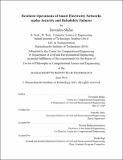Resilient operations of smart electricity networks under security and reliability failures
Author(s)
Shelar, Devendra(Devendra Anil)
Download1129596823-MIT.pdf (4.720Mb)
Other Contributors
Massachusetts Institute of Technology. Department of Civil and Environmental Engineering.
Advisor
Saurabh Amin.
Terms of use
Metadata
Show full item recordAbstract
Blackouts (or cascading failures) in Electricity Networks (ENs) can result in severe consequences for economic activity, human safety and national security. Recent incidents suggest that risk of blackouts due to cyber-security attacks and extreme weather events is steadily increasing in many regions of the world. This thesis develops a systematic approach to evaluate and improve the resilience of ENs by addressing following questions: (a) How to model security and reliability failures and assess their impact on ENs? (b) What strategies EN operators can implement to plan for and quickly respond to such failures and minimize their overall impact? (c) How to leverage the operational flexibility of "smart" ENs to implement these strategies in a structured manner and provide guarantees against worst-case failure scenarios? We focus on three classes of cyber-physical failures: (i) Inefficient or unsafe economic dispatch decisions induced by an external hacker who exploits the vulnerabilities of control center software; (ii) Simultaneous disruption of a large number of customer-side components (loads and/or distributed generators) by a strategic remote adversary; (iii) Correlated failures of power system components caused by storm events (or hurricanes) with high-intensity wind fields. We develop new network models to capture the impact of these failures, while accounting for a broad range of operator response actions. These actions include: partial load control, pre-emptive disconnection of non-critical loads, active and reactive power supply by Distributed Energy Resources (DERs) capable of providing grid-forming services, and formation of microgrid islands. We develop practically relevant operational strategies to improve the ENs' resilience to failure classes (i) and (ii) (resp. (iii)) based on solutions of bilevel mixed integer programming (resp. two-stage stochastic optimization) formulations. Our bilevel mixed integer programming formulations capture the worst-case impacts of attacks on radial distribution networks operating under grid-connected or microgrid configurations. For the case when the operator response can be modeled as continuous decision variables, we provide a greedy heuristic that exploits the radial network structure and provides near-optimal solutions. For the more general case of mixed-binary decision variables, we develop a computationally tractable solution approach based on Benders Decomposition method. This approach can be used to evaluate the value of timely response actions in reducing various losses to the network operator during contingencies induced by attacker-induced failures. We provide some guidelines on improving the network resilience by proactive allocation of contingency resources, and securing network components in a strategic manner. Furthermore, under reasonable assumptions, we show that myopically reconnecting the disrupted components can be eective in restoring the network operation back to nominal condition. Our two-stage stochastic optimization formulation is motivated by the need of a decision-theoretic framework for allocating DERs and other contingency resources in ENs facing the risk of multiple failures due to high-intensity storm events. The stochastic model in this formulation captures the dependence of probabilistic failure rates on the spatio-temporal wind intensities. Importantly, the formulation allows for the formation of microgrid islands (powered by the allocated DERs), and considers joint DER dispatch and component repair decisions over a multi-period restoration time horizon. We present computational results based on the classical sample average approximation method, with Benders Decomposition applied to solve the mixed-binary programs associated with the restoration stage. Finally, we compare the optimal repair decisions with a simpler greedy scheduling strategy that satisfies soft-precedence constraints.
Description
This electronic version was submitted by the student author. The certified thesis is available in the Institute Archives and Special Collections. Thesis: Ph. D. in Computational Science and Engineering, Massachusetts Institute of Technology, Department of Civil and Environmental Engineering, 2019 Cataloged from student-submitted PDF version of thesis. Includes bibliographical references (pages 265-276).
Date issued
2019Department
Massachusetts Institute of Technology. Department of Civil and Environmental EngineeringPublisher
Massachusetts Institute of Technology
Keywords
Civil and Environmental Engineering.